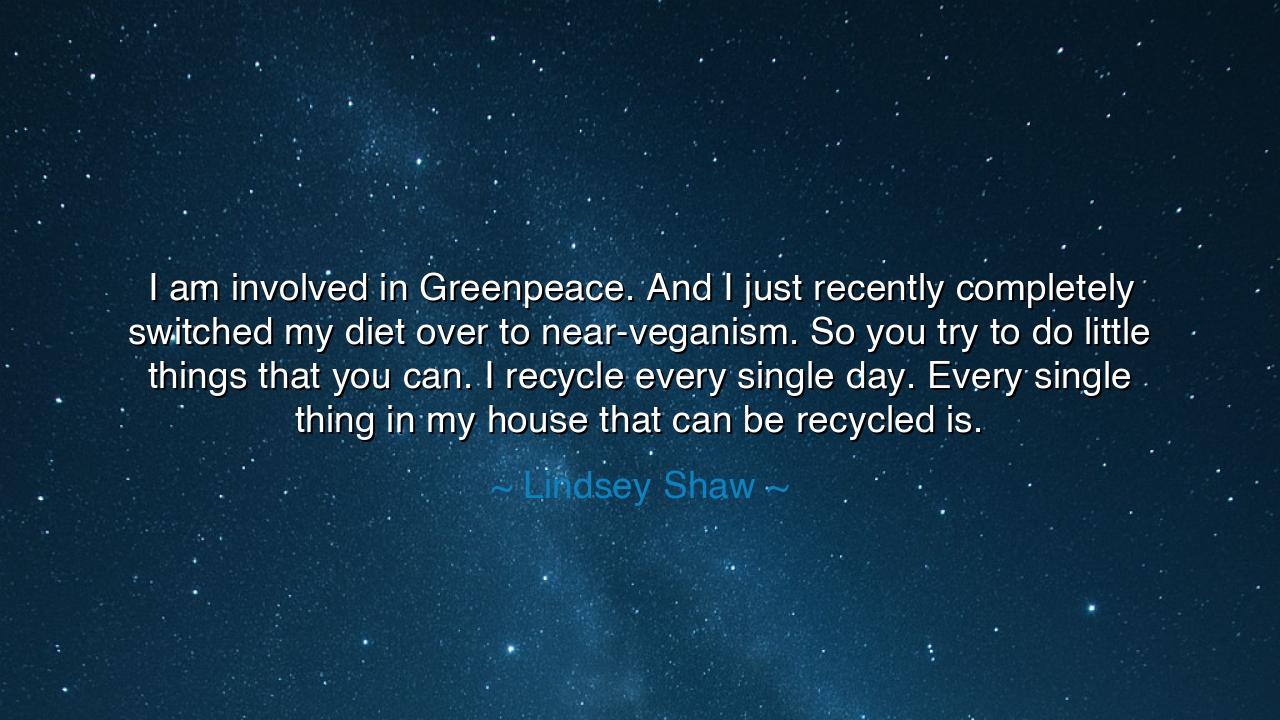
I am involved in Greenpeace. And I just recently completely
I am involved in Greenpeace. And I just recently completely switched my diet over to near-veganism. So you try to do little things that you can. I recycle every single day. Every single thing in my house that can be recycled is.






When Lindsey Shaw said, “I am involved in Greenpeace. And I just recently completely switched my diet over to near-veganism. So you try to do little things that you can. I recycle every single day. Every single thing in my house that can be recycled is,” she was not merely speaking of personal habits, but of responsibility, reverence, and awakening. Her words, though humble, echo the eternal wisdom that great change begins not in grand gestures, but in the small, faithful acts of conscience performed every day. She speaks as one who understands that humanity’s bond with the earth is sacred — and that to live rightly upon this planet is an act of love, not just survival.
At its heart, this quote is about stewardship — the recognition that we do not own the earth, but borrow it from the generations that will come after us. Shaw’s commitment to recycling, to near-veganism, and to her involvement with Greenpeace reflects the ancient truth that the world is not healed by a single savior, but by countless souls who each take up a fragment of the burden. Her words remind us that no effort is too small, no act of mindfulness too insignificant, when it is born from compassion. For the health of the planet mirrors the health of the spirit, and to pollute one is to wound the other.
This teaching is as old as civilization itself. The Indigenous peoples of every continent lived by the law of reciprocity — the understanding that what you take from the earth must be returned in gratitude and care. Among the Native American tribes, the saying was passed down: “We do not inherit the earth from our ancestors; we borrow it from our children.” To live in harmony with nature was not a moral choice, but a spiritual duty. Shaw’s modern devotion to sustainability carries this same timeless spirit — that to live consciously is to honor the web of life that sustains us all.
The decision to follow a near-vegan diet also carries a profound symbolic meaning. It is an act of restraint, of compassion toward the creatures of the earth and toward the body itself. In every era, the sages have taught that to consume consciously is to live wisely. The Buddha, in his teachings, urged moderation and awareness in eating, reminding his followers that every meal is a moral act, not just a physical one. By choosing plant-based nourishment, Shaw aligns herself with that ancient lineage of mindfulness — a quiet rebellion against the culture of excess, and a return to balance and empathy.
Her words, “you try to do little things that you can,” hold a wisdom that defies cynicism. In an age overwhelmed by global crises, many lose hope because they cannot change everything at once. But Shaw’s philosophy is a reminder that greatness begins with consistency, not scale. The Chinese philosopher Lao Tzu once said, “The journey of a thousand miles begins with a single step.” Every bottle recycled, every meal chosen with care, every voice raised in defense of the natural world — these are the steps that, together, form the path to renewal. One person’s discipline may seem small, but when multiplied by millions, it becomes a tide powerful enough to reshape the future.
There is also humility in her statement — the recognition that she is still learning, still striving, still imperfect. She does not boast of saving the world; she simply commits to doing her part. This humility is the mark of the true environmentalist, and indeed, of the wise in all ages. For arrogance destroys, but humility preserves. To say, “I do what I can,” is to acknowledge one’s place in the great cycle of creation — not as a master, but as a caretaker. The ancients would have called this virtue in harmony: the alignment of one’s actions with the rhythm of the world.
The lesson, then, is clear and profound: live with intention, and the world will heal through you. Do not wait for others to begin. Recycle, reduce, and restore. Eat with gratitude, act with compassion, and treat the earth as your home, not your possession. Let every day be marked by one conscious act of care, however small — for it is from these drops of devotion that oceans of change are formed.
So, my listener, remember this: to live rightly is to walk gently. Each choice you make — what you eat, what you buy, what you waste — ripples across the living world. Like Lindsey Shaw, strive not for perfection, but for mindful participation in the great dance of life. For when many hearts choose awareness over apathy, the earth itself breathes easier — and in that breath, we rediscover what it means to be truly human: not conquerors of nature, but her eternal kin.






AAdministratorAdministrator
Welcome, honored guests. Please leave a comment, we will respond soon